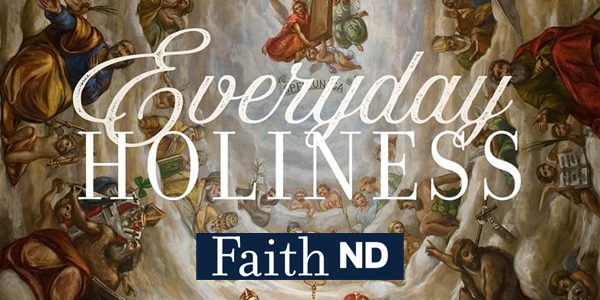The Value of Kinship in Leadership
Subscribe to the ThinkND podcast on Apple, Spotify, or Google.
Featured Speakers:
- Tom Schreier ’84, Founding Director, Inspired Leadership Initiative, University of Notre Dame
- Dave MacLennan, Chairman and CEO, Cargill
The first virtual event in the series Inspiring Conversations: Kinship tackled how leaders, particularly in business, can create environments of comfort and foster authenticity. This event was moderated by Tom Schreier ’84, the founding director of the Inspired Leadership Initiative at the University of Notre Dame. Schreier was joined by Dave MacLennan, the CEO and Board Chair of Cargill. This discussion covered everything from how MacLennan conducts business while preserving and strengthening the dignity of his employees and peers to how great thinkers of our generation value the experiences and wisdom that come with aging. The session concluded with an opportunity for the speakers to answer some questions from live audience members and online viewers.
Schreier opened the conversation by introducing Dave MacLennan and a book recently enjoyed by the two men, Tattoos on the Heart by Father Greg Boyle. In the book, Fr. Boyle recounts his days immersed in the Los Angeles gang community. In fostering a kinship with people young and old in Los Angeles living completely different lives than the religious man, he gave the gang members dignity, confidence, hope, and comfort. MacLennan understands the concept of kinship in the book as accompaniment with someone quite different from oneself. In having a true appreciation for another person’s perspective and way of life, genuine relationships can be built, and we can begin to understand others’ lived experiences. MacLennan and Schreier spoke enthusiastically about how important it is to break down borders between different groups. Doing so removed discomfort between cultures that might have once been opposed or completely misunderstood. Beyond giving comfort to the gang members and poor individuals living in the LA area, Father Boyle found comfort with their differences, and a mutual respect for each other was established.
The conversation then transitioned to a more corporate-minded discussion involving very current career changes in MacLennan’s life as his accepted that the time for retirement (from a traditional career) was near. Arthur Brooks speaks about an addiction to success in his book From Strength to Strength, an experience MacLennan believes many working professional have as they age into retirement. At some point in life, each individual must know when to pivot toward more atypical business jobs that truly work to benefit others and develop one’s own self-worth; that is, corporate life cannot exist forever, despite a person’s enthusiasm for business. Schreier and MacLennan discussed liquid knowledge, or peak learning capacity and know-how, and crystallized knowledge. Crystallized knowledge manifests as fossilized experiences to pass knowledge on to the next generation. Both kinds of knowledge are endlessly beneficial to the individual and those around them; however, they each have their time and place to be most meaningfully put to use. The second curve, as MacLennan calls it, is when one’s traditional career ends and the individual can retain their crystallized knowledge while also having liquefied knowledge in a different field. Despite retirement, humans still retain the capacity to learn in the midst of experiences in middle age.
People can still be contributing members of society without dedicating 40 or more hours a week to commercial efforts. Social, spiritual, and physical endeavors are just as meaningful and gives a person purpose. Traditional measures of success are title, status, recognition, and money; however, there are other way to define success. MacLennan recommends breaking from traditional ways of existing, like traditional schedules and relations. If a businessman or businesswoman stays in corporate America (or corporate anywhere) for too long, they intellectual knowledge and wisdom in a way peak. This peak is even more detrimental if the individual is in a position of power, where one might get too power hungry or clouded in their thinking. Peaking in a commercial setting is the equivalent of a progress plateau or even a downhill spiral that can negatively impact oneself an others. Instead of continuing to ride a wave of power, work, and experiences congruent to those shaping one’s entire life, we must continue challenging ourselves to do better.
Schreier also talked to MacLennan about the people in his own life that helped the CEO of nine years succeed and thrive. MacLennan dutifully recognized many individuals at different stages of his professional career that gave him advice, insights, and support, noting that no one gets anywhere without the help of others. Beyond having contacts that you can lean on, Schreier probed MacLennan about those true kinships that he values mosts and foresees keeping even when he steps down from his leadership role and retires. MacLennan noted that one must try to identify authentic relationships that won’t fall away as the titles, money, or power does. Maintaining genuine relationships is crucial, in the later years of life. The world tends to honor authenticity; however, on the personal level concerning relationships, this cannot be true. One must look for individuals who are willing to open up, share similar values, and can enhances one’s capabilities outside the scope of one’s job.
Schreier and MacLennan’s conversation concluded with remarks from the audience and a deeper dive into some of MacLennan’s experiences in his career. A woman from the audience told a story about a mentorship relationship she is currently in, during which she advised her mentee to listen with her eyes. MacLennan supported this advice, emphasizing how important it is to be completely present and authentic in every learning opportunity. He also discussed kinship within an organization, especially along the lines of diversity and company culture. More diversity leads to profound transformations in company culture, beyond what objectives the company can accomplish. New perspectives bring new levels of authenticity. MacLennan encouraged going beyond including people of color, women, and other minorities in the workplace; instead, put them in positions of leadership and upper management to offer guidance and role models to, particularly, other minorities who resemble them. This small change can be life-changing to one individual and eventually an entire organization. He also spoke on the importance of creating kinship within the organization’s c-suite. As a CEO, he could have chosen to lock himself away in a top-floor office and socialize only with those in similar positions. However, by meeting employees beyond one’s personal office building or competency (e.g. CEO meeting salt miners), one can make great strides in the relationships, comfort, and mutual respect that exist throughout a corporation.
A concept under many names including Parker Palmer’s clearness committee or personal board of directors, are the people who might not always have the right answers but will ask the right questions. It is these people who help our most notable leaders in any sector succeed. (34:35)
Cultural/pop culture/mainstream show/music references:
- Tattoos on the Heart by Father Greg Boyle (10:00)
- From Strength to Strength by Arthur Brooks
- Parker Palmer’s clearness committee (34:30)
- “Ultimately people want a place to go and something to do. And that’s how you achieve your own dignity and sense of self worth.” (MacLennan, 14:50)
- “Two young goldfish are swimming in the bowl, and here comes the older goldfish. The older goldfish says, ‘Hey boys, how’s the water?’ and swims away. And one of the young goldfish looks at the other and says, “What’s water?., meaning you get used to your circumstances and your surroundings… that’s I think why you’re here: is discovering what can you do next or incrementally from here from your successful career and so that you don’t just forget, that you don’t just say what is water” (MacLennan, 30:50)
- “How could you keep your own counsel? How could you think that you’re so smart and so wise and so informed that you don’t need somebody else’s advice or that you don’t rely on somebody else’s advice.” (MacLennan, 32:50)
- “Those who you lead want to know who you are: what do you stand for, what are your values, and how did you get to where you are?” (MacLennan, 37:50)
November 10, 2022
Related Content
Shannon Sharpe/Katt Williams, The Black Impact on the NFL Super Bowl & Taraji P Henson
In the first episode for Season 8, Isaiah and Tykiera talk about the Shannon Sharpe/Katt Williams Interview that took the internet by storm at the beginning of the year as well as...
watch videoEveryday Holiness: John Cavadini
Dr. John Cavadini, director of the McGrath Institute for Church Life and professor in the theology department at the University of Notre Dame, shares some of the hidden aspects...
View EventClimate Change and The Limits of Narrative
Join the Kellogg Institute for the introductory session of a workshop refining Kellogg Faculty Fellow Roy Scranton’s draft book project “Ethical Pessimism: Climate Change and...
View Event


